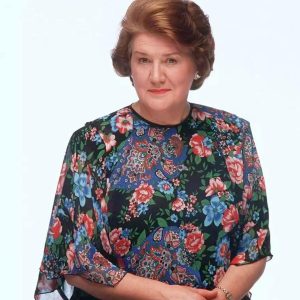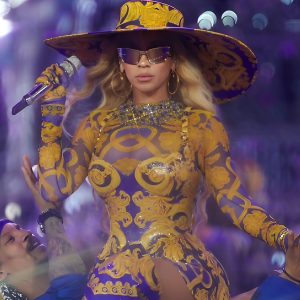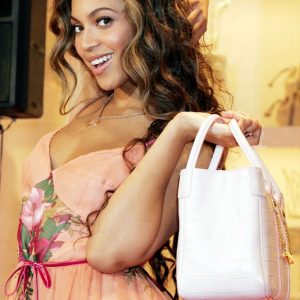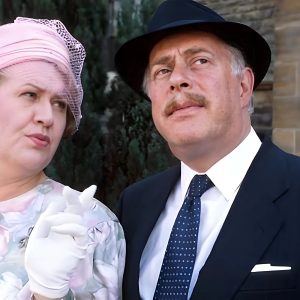“An Accident of Birth”: The Comic Tragedy and Enduring Legacy of Hyacinth Bucket’s Delusions of Grandeur
In the pantheon of British television comedy, few characters are as instantly recognizable—or as delightfully insufferable—as Hyacinth Bucket (pronounced “Bouquet”), the iconic social climber from Keeping Up Appearances. Created by Roy Clarke and brought to vivid, cringe-worthy life by Patricia Routledge, Hyacinth has become a cultural touchstone: a woman hopelessly obsessed with refinement, elegance, and the appearance of importance. Yet beneath her exaggerated affectations and insistence on middle-class pretensions lies a tragicomic soul whose aspirations, though grand, are rooted in something profoundly human.
Perhaps no line better encapsulates Hyacinth’s grand delusion than her famously delivered assertion: “It’s only an accident of birth that I’m not someone important.” With those words—delivered with the kind of theatrical gravity befitting a Shakespearean heroine—Hyacinth lays bare the very essence of her character: a belief in her own unrecognized magnificence, thwarted only by the cruel misfortune of being born to the “wrong” family.
This singular line doesn’t just evoke laughter—it reveals the show’s central satire and emotional undercurrent. On the surface, it’s a punchline: a woman whose every move screams middle-class anxiety genuinely believes she’s a duchess in waiting. But dig deeper, and it’s a tragic insight into a life spent chasing illusions of grandeur, in which self-worth is measured not by character or contribution, but by tea services, candlelight suppers, and the frequency of royal correspondence (real or imagined).
The Irony of Importance
What makes Hyacinth’s declaration so memorable is the staggering irony at its core. She is, to put it plainly, desperate to be seen as important. Yet all her attempts to cultivate an upper-class image—her obsessive hosting of candlelit dinners, her exaggerated telephone manner, her corrected pronunciation of “Bucket” as “Bouquet”—only amplify her social awkwardness. Her “importance,” she believes, should be self-evident, if not for that dreadful “accident” of being born into a working-class family.
But in the world of Keeping Up Appearances, it is not Hyacinth’s origins that hold her back—it is her behavior. Her relentless striving makes her blind to the very qualities that earn genuine respect: humility, authenticity, and emotional intelligence. Instead, she replaces these virtues with a brittle façade of social etiquette and misguided superiority. Ironically, her obsessive quest for elevation makes her the very caricature she wishes to escape.
A Class Act—In Her Own Mind
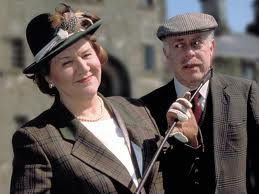
Hyacinth’s character represents a particular British anxiety: the social mobility that emerged in post-war Britain, and the psychological toll it took on those caught in its shifting sands. Hyacinth was not born to privilege, but she is determined to reinvent herself as its embodiment. Her house, a shrine to faux refinement, is her kingdom; her husband Richard, her beleaguered subject. And her family? A source of perpetual embarrassment.
Hyacinth’s efforts to distance herself from her relatives—her sisters Daisy, Rose, and Violet (the one with the Mercedes, swimming pool, and room for a pony)—only deepen her disconnect from reality. Her father, affectionately referred to as “Daddy” but treated more like a liability than a parent, and her rough-around-the-edges kin, are the reminders of her origin story—one she seeks desperately to rewrite.
Yet these characters do more than frustrate Hyacinth; they ground the show in warmth and relatability. Where Hyacinth is concerned with artifice, her family—however chaotic—offers moments of honesty, connection, and humor that Hyacinth’s curated world sorely lacks.
The Comic Genius of Delusion
The genius of Keeping Up Appearances lies in its ability to make Hyacinth both ridiculous and sympathetic. Yes, her pretensions are ludicrous, and yes, her superiority complex often borders on insufferable. But audiences love her—not in spite of her flaws, but because of them. She is a character who lays bare her insecurities through exaggerated elegance and unwitting slapstick.
Her belief that being born into a wealthier family would have catapulted her into aristocratic circles is as hilarious as it is heartbreaking. She truly imagines herself hosting garden parties attended by minor royals, being addressed as “Madam,” and discussing the finer points of porcelain with a visiting ambassador. The comedy lies in how the universe never quite plays along with her fantasy—there’s always a muddy shoe, an ill-timed phone call, or an uninvited family member to crash her illusion.
And through it all, Patricia Routledge’s performance is nothing short of masterful. With impeccable comic timing, arched eyebrows, and a voice that can elevate a phrase like “riparian entertainments” to high comedy, Routledge transforms Hyacinth into a figure of tragicomic brilliance. She’s deluded, yes—but never cruel. Egotistical, but rarely malicious. She is, at her core, a woman who wants to matter.
A Mirror to Our Own Aspirations
What elevates Hyacinth from mere farce to enduring icon is the uncomfortable familiarity of her struggle. Who among us hasn’t felt the sting of being overlooked? Who hasn’t dreamed of being seen as special, important, worthy? Hyacinth simply takes these desires to their most theatrical extreme. Her life is a performance, staged with bone china and lace doilies, aimed at convincing the world—and herself—that she belongs somewhere grander.
Yet in the end, it’s not social status that makes Hyacinth unforgettable. It’s her humanity. Her flaws are magnified, but her fears are real. She wants love, admiration, and a life that feels significant. But in mistaking appearance for substance, she misses the chance to find that significance in the people around her—and, perhaps, within herself.
The Enduring Legacy
Over thirty years since Keeping Up Appearances first aired, Hyacinth Bucket remains a towering figure in British television history. Her lines are endlessly quoted, her antics eternally rerun, and her legacy firmly intact. The line “It’s only an accident of birth that I’m not someone important” continues to resonate not only as a comedic gem but as a poignant commentary on the illusions we construct to feel worthy.
In a society still grappling with class, image, and the quest for identity, Hyacinth serves as both a cautionary tale and a comedic release. Her story reminds us that the pursuit of “importance” can be both absurd and deeply moving—and that sometimes, the most important thing we can be is honest with ourselves.
Would you like this adapted for publication or shared in a press-release format?
